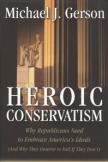Redeeming the Political Enterprise
The former White House speechwriter Michael Gerson, widely credited with authorship of such George W. Bush catchphrases as “axis of evil” and “the soft bigotry of low expectations,” is no stranger to big ideas. And here he has assumed no small task. In Heroic Conservatism, Gerson deploys his winged words and his status as semi-official interpreter of Bush’s political philosophy in a stout effort to rescue his party from a cramped vision of minimal government and low taxes—in favor of a robust pursuit of the common good.
Progressives who cannot conceive of “W” sharing a sentence with “common good”—or “winged words” or “political philosophy,” for that matter—may find in Heroic Conservatism a more generous, interesting exposition of the president’s worldview than the one they find in the echo chamber of the liberal blogosphere. But the author’s intended audience is the conservative movement, to whom he declaims:
I am convinced that the bold use of government to serve human rights and dignity is not only a good thing, but a necessary thing. I believe the security of our country depends on idealism abroad—the promotion of liberty and hope as the alternatives to hatred and bitterness. I believe the unity of our country depends on idealism at home—a determination to care for the weak and vulnerable, and to heal racial divisions by the expansion of opportunity. And I believe my party, the Republican Party, must carry this message of idealism and courage to a tired nation in a pivotal moment, or face a severe judgment of history.
There are those who look at the 2008 Republican presidential contest and see rifts between social and economic conservatives divided by domestic policy, or between realists and neoconservatives divided by foreign policy. For Gerson, “the two intellectually vital movements within the Republican Party today are libertarianism and Roman Catholic social thought.” The author’s intraparty opponents are apt to disparage government by quoting Ronald Reagan’s first inaugural to the effect that “government is not the solution to our problem, government is the problem.” Gerson, though himself a Protestant, finds in Catholic social teaching not just a subsidiarity that respects the limits of government but also a call to solidarity that can redeem the political enterprise as an agency of the common good.
Do not look to Gerson for the studied syllogisms of the Scholastic, however; Heroic Conservatism is the earnest witness of an evangelical. The book is less argument than autobiography, most of it occupied by the tale of Gerson’s career in big-time national politics. Because then Governor George W. Bush exhibited a genuine interest in creative political action on behalf of the poor and vulnerable that resonated with Gerson’s own sentiments of Christian charity, Gerson leapt at the opportunity to help define the president’s new “compassionate conservatism.” He was excited to be present at the creation of the Office of Faith-Based Initiatives and the legislation known as No Child Left Behind, despite the skepticism of small-government purists. “Because the oppression of the weak is an offense against the image of God, politics is an urgent calling,” Gerson scolds such doubters. Testify, Michael, testify!
But in the aftermath of the terrorist attacks of Sept. 11, 2001, relatively modest efforts to mend the broken at home were eclipsed by bigger game. Gerson, like Bush, was captivated by the opportunity for political heroism of a higher order: the prospect of changing the course of history by remaking the Middle East in our image as a stronghold of liberal democracy. With Gerson’s help, the president would frame the war on terror as a climactic confrontation between good and evil, with the peaceable kingdom but a few years away if Americans had the courage to grasp the opportunity.
Gerson contends that setbacks of the Iraq occupation empowered conservative critics of Bush’s ambitious politics, who struck back against the president and his costly agenda—for that matter, against the speechwriter-enabler who had tread so casually on such conservative dogmas as the rectitude of the free market and the law of unintended consequences. Gerson retired from the White House in 2006 and has taken heavy flak from his Republican colleagues since. In his column “The Real Heroism: Restraint,” George F. Will, speaking as the voice of conservative orthodoxy, essentially read Gerson out of Gerson’s own movement.
But Gerson’s tale is probably less a serious dispute about political ideology than the perennial story of the Christian in politics, who is bound to come to grief trying to reconcile transcendent political ideals with temporal political alignments. It is a story as old as Thomas More and as fresh as Arkansas’s Gov. Mike Huckabee—upon whom Will also recently pronounced an anathema for being a bit too compassionate. And it is not confined to one party. One need only recall the fate of the late Gov. Bob Casey of Pennsylvania, famously barred from the 1992 Democratic Convention’s speaker list for his pro-life views. As Gerson (a Casey admirer) reminds us, “Christian social teaching is not identical to either political ideology; it stands in judgment of both.”
This article also appeared in print, under the headline “Redeeming the Political Enterprise,” in the April 14, 2008, issue.








